- Latest articles

Each of us have weaknesses that we struggle with. But the Holy Spirit is our Helper!
Be joyful in hope, patient in affliction, faithful in prayer. (Romans 12:12)
Patience was not my strong point before I was renewed in my faith.
I am ashamed when I recall moments when I lost my temper, such as the time I blasted someone at the shop for being “racist” to my mom; the incident at work in the Philippines when I stormed into the general’s office demanding justice for the employees; the many occasions when I’ve stuck up the rude finger to someone who overtook me (maybe this is why the Lord did not allow me to continue driving!); and the many pathetic little episodes of intolerant, rude behaviour, or sullen sulkiness when I did not get my own way.
I was so impatient. If someone didn’t turn up on the dot at the time we had agreed to meet, I would leave immediately, justifying that they were not worthy of my time. When the Lord beckoned me, patience was one of the first fruits that I gained from the Holy Spirit. The Lord impressed upon me that I could not be a good servant if I did not have a compassionate, patient, and understanding heart.
Learning to Wait
Recently, my husband took me to Melbourne’s Eye and Ear Hospital for an emergency check. It brought back memories of the years when I travelled daily to the Central Business District (CBD), joining thousands of city workers who looked so unhappy but comforted themselves with the thought that they had the job of a lifetime. I even worked a lot of overtime, thinking I would get rich by doing so (I didn’t).
Working in the corporate sector, the only joy I got was running over to lunchtime Mass at St. Patrick’s or St. Francis’. If I was really bored, I would wander aimlessly down the Myer Mall, meaninglessly shopping for things that gave me temporary happiness. Every day, I asked the Lord when He would “release” me from the tiresome daily commute and the unfulfilling jobs. I would have said it was a waste of my valuable time if not for the daily Masses, the good friends I met, and the way I used the time on the train—praying, reading good books, and sewing tapestries.
As I look back, it took many years for Him to answer my prayer—to give me meaningful work within my locality, just fifteen minutes’ drive from home. I had persisted in my prayer, never giving up hope and trust that He would have mercy on me and heed my request.
When I finally said goodbye to city work, I felt a weight lift off my shoulders. I was finally free from that daily drudgery. Although I was grateful for the experience, I felt refreshed, looking forward to a more peaceful pace of life. With an ageing body, my mind was slowing down, and my coping mechanisms were becoming more limited.
When I returned to walk down those familiar streets again, it seemed that nothing much had changed—the street beggars were still there; some corners still smelt of urine and vomit; people paced and up down, walking, running or chasing the next train; people queued to order at the restaurants which had proliferated; and retail stores still jostled to display their wares enticingly to loosen wallets. The sound of sirens abounded. Police presence was strong, and I prayed for my daughter, wondering how she was coping with her job protecting city life.
It was all so familiar that it felt like déjà vu, but the only comfortable refuge I found was in St. Patrick’s Cathedral, where I had been a lector at lunchtime Mass, and St. Francis’ where I had knelt before Mother Mary to light a candle on my first arrival in Australia. My fervent prayer for a good husband was answered in three weeks. God knows when things are urgent.
Much-Needed Virtue
The IBelieve website shares this wonderful teaching. The popular saying “patience is a virtue” comes from a poem around 1360. However, even before then the Bible often mentions patience as a valuable quality. Patience is commonly defined as the capacity to accept or tolerate delay, trouble, or suffering without getting angry or upset. In other words, patience is essentially “waiting with grace.”
Part of being Christian is the ability to accept unfortunate circumstances gracefully while having faith that we will ultimately find resolution in God. In Galatians 5:22, patience is listed as one of the fruits of the Spirit. If patience is a virtue, then waiting is the best (and often most unpleasant) means by which the Holy Spirit grows patience in us. But our culture does not value patience in the same way that God does.
Why be patient? Instant gratification is much more fun! Our increasing ability instantly to satisfy our wants may be taking away the blessing of learning how to wait well. How, then, do we wait “well”? I recommend you read the entire article. Patience is waiting quietly; it is waiting eagerly. Patience is waiting until the end; it is waiting expectantly. Patience is waiting joyfully; it is waiting with grace. But the one thing we shouldn’t wait for and not postpone for another second is acknowledging Jesus as Lord and Savior of our lives. In the twinkle of an eye, we could be called to surrender our life.
Pursuing Patience
Since the Feast of Pentecost 20 years ago, I have been renewed in my faith. I am deeply grateful to the Holy Spirit for giving me the virtue of patience, changing me from a miserable, angry sinner into someone who has the ability to wait for His leading and help. This is the mystery of this gift. You cannot do it alone—you need Divine Grace. I did not turn into a gentle, patient person over night, and every day is a testing ground for me. Patience is said to be the “banana” of the fruits of the Holy Spirit, as it can quickly rot. I continue to be tested, but the Holy Spirit hasn’t let me down. While I was writing this article, I managed to wait on the phone for 4 hours to get an issue resolved!
The world never ceases to beckon me to hurry on. The devil is always trying to lure me into another trap by annoying me until I lose control. My egocentric self is always demanding that I should come first, so I am very much in need of the Holy Spirit to help me to maintain my patience with self-control. However, to truly exercise patience to everyone around us, Saint Francis de Sales tells us that we must first be patient with ourselves. A word of caution though. Patience is not about allowing ourselves to be a victim of abuse or enabling sinful behaviour. But that is a topic for another time, so I ask for your patience.
“The key to everything is patience. You get the chicken by hatching the egg, not by smashing it.” – Arnold Glasow
'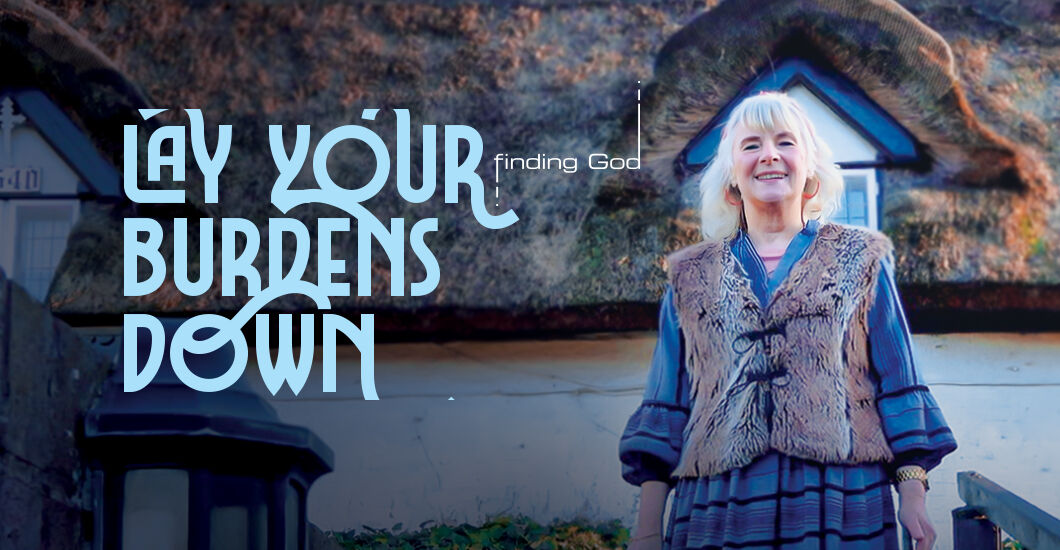
Overwhelmed by life’s burdens? Find out how you can heave a sigh of relief
For many years of my marriage, I carried the burden of being married to a spouse who didn’t share my faith. As parents, many of us carry the burdens of our children and family members. But I would say to you, trust in God’s plan, trust in His perfect timing for His divine providence. Psalm 68:18-20 says, “Praise be to the Lord, to God our Savior, who daily bears our burdens.” What should we do with our burdens?
Firstly, don’t despair. When we are discouraged, it is never of the Lord. We know that the Bible tells us in Mathew 6:34, “So do not worry about tomorrow, for tomorrow will bring worries of its own.” Scripture also says, “Each day has enough trouble of its own.” When we are at peace, it’s of God, but when we are worried, it’s of the devil. There is no worry in Heaven, only love, joy and peace.
My beloved husband, Freddy, developed Alzheimer’s disease in the last eight and a half years of his life. Through this period of living with a husband who had Alzheimer’s, I found that the Lord’s grace was amazing in my life. He gave me the grace not to carry the burden of his illness. This could have destroyed me. I found myself in a position where I had to pray and continually give everything to the Lord, on a moment by moment basis. When you live with someone who has Alzheimer’s life is constantly changing. Every morning when I get up, I go to the Bible. I make it the first fruits of my day. I know that my Jesus already carried every one of our burdens when He died on the Cross for us. He has paid the price for each one of us, and He waits for each of us to appropriate the many blessings that He has purchased for us through His death on the Cross.
Promises That Sustained Me
In that season I learned many lessons. I learned that sometimes God doesn’t want to change our circumstances, but He wants to change your heart through the circumstances that you are going through. That is exactly what happened to me. I learned more in the valleys than I did in the promised land and on the mountain tops. When you face challenging situations, you learn to swim or you flop to the bottom. You learn that God can find a way where there is no way.
I would continually ask the Lord, “Give me the grace like Paul to be content in all circumstances.” In the letter to the Philippians, Paul writes that he has learnt to be content regardless of the circumstances. Then he made this statement, “I can do all things through Christ who strengthens me.” We have to know it is the Lord’s strength and not our strength that carries us. We have to trust in the Lord and not depend on our own understanding. We have to cast our burdens onto Him and allow Him to sustain us. When we start to go into worry mode, we just spiral downwards. That’s when we need to come to the Lord and give Him our burdens. “Come to me, all you who are weary and burdened, and I will give you rest. Take my yoke upon you and learn from me, for I am gentle and humble in heart, and you will find rest for your souls” (Matthew 11:28, 29) is a fantastic scripture verse that has carried me all through the eight and a half years. That’s a promise! So each of us in faith have to be prepared to throw the whole weight of our worry and anxieties for ourselves and our loved ones onto the Lord.
Mission Possible!
Take a moment now to give to the Lord all those people that you carry in your heart. It might be your spouse, your children, or someone else who has gone astray or is rebellious. Take a leap of faith now and give it all to the Lord because He cares for you. Give to the Lord all those areas where the enemy of your soul has robbed you of your peace. It took twenty-eight long years of waiting before my husband came to know Jesus. I would give him to the Lord all the time. I would say that he is a “testimony-in-the-making,” and I never gave up. God converted him and healed his soul through a dream. God’s timing is so different from ours. Luke 15:7 says, “there will be more rejoicing in Heaven over one sinner who repents than over ninety-nine righteous persons who do not need to repent.” I can tell you, there was a full-blown party in Heaven when my Freddy converted! The Lord showed me that he was one of my great missions. Who is your great mission? Is it your husband, your wife, son, or daughter? Ask the Lord to touch them and He will grant these prayers.
It’s Never Too Late
My Freddy went home to glory on May 14th, 2017. I know that he is up there now, and he is looking down on me. In Luke 5:32 Jesus says, “I have not come to call the righteous, but sinners to repentance.” So, God’s mercy is FOR sinners, and we are all saved by His grace.
The Lord says in Isaiah 65:1, “I revealed myself to those who did not ask for me; I was found by those who did not seek me. To a nation that did not call on my name, I said, ‘Here am I, here am I.’”
In Saint Faustina’s Diary we read about God’s mercy towards the dying: “I often attend upon the dying and through entreaties obtain trust in God’s mercy for them, and implore God for an abundance of divine grace, which is always victorious. God’s mercy sometimes touches the sinner at the last moment in a wondrous and mysterious way. Outwardly, it seems as if everything were lost, but it is not so. The soul, illuminated by a ray of God’s powerful final grace, turns to God in the last moment with such a power of love that, in an instant, it receives from God forgiveness of sin and punishment, while outwardly it shows no sign either of repentance or of contrition, because souls [at that stage] no longer react to external things. Oh, how beyond comprehension is God’s mercy!” (Paragraph 1698)
Let’s pray: Lord we come to the throne room of grace where we will find grace in time of need. We bring before you the ones who are treasured in our hearts. Grant them the grace of repentance and conversion. Amen.
'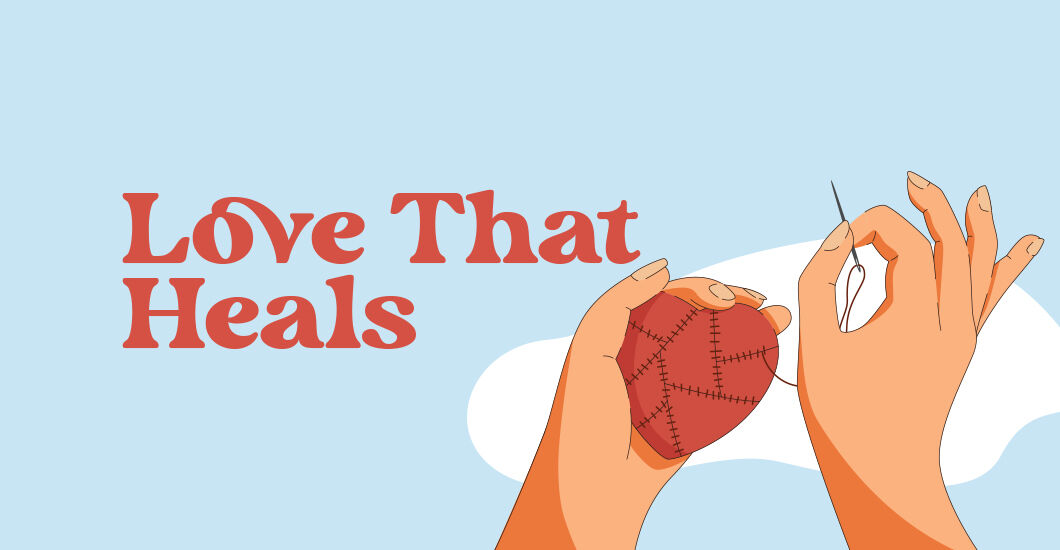
Yearning to feel God’s love deep in your heart? All you need to do is ask
I heard my son’s truck pull into the driveway. I quickly pushed back tears, wiped my face with my sleeve, and went out into the garage to greet him.
“Hey Mom,” he said with a grin.
“Hey honey.”
“What brings you here this morning?” I asked.
“Dad said I received a package. I’m going to grab it before I head out to the office,” he said.
“Oh, okay,” I replied.
He grabbed the package and I followed him out to his truck.
He gave me a big hug.
“You okay Mom?” he asked.
“I’m okay,” I answered with a shrug.
I turned my face to hide my tears.
“She’s just going through a rough patch. She’ll be alright,” he said gently about his sister.
“Yeah, I know. It’s hard though. It’s just too much sadness. Her sadness is just too tough for me. I don’t know why but from a young age I’ve been surrounded by people struggling with sadness. Is it just my lot in life?”
He raised his eyebrows questioningly.
“Or maybe,” I continued, “there’s something here I need to see.”
“Maybe. I’m here Mom if you need me,” he said.
Haunting Memory
“Depression can be part of a family system,” my therapist said. “You and your daughter are very close, but sometimes relationships can get enmeshed. What I mean is that there need to be boundaries, a healthy separation for growth and independence.”
“I just feel like I’ve worked so hard to make changes but honestly, I can’t bear her sadness,” I replied. “And little things feel so big. Like Easter evening. After dinner, my daughter asked if she could visit her boyfriend. As I watched her pull out of the driveway a wave of dread and panic washed over me. I know her leaving was not about me, but I felt so much shame,” I said.
“Can you remember when you first felt that type of panic and dread?” the therapist asked.
I began sharing the difficult memory that immediately surfaced.
“We were all in my parents’ bedroom,” I said. “Dad was angry. Mom was a wreck. She was holding my baby brother and trying to calm down my dad, but he was too mad. We were getting ready to sell our house to move to a new one. Dad was raging because the house was in a shambles, as he put it.”
“How old were you?”
“About seven,” I said.
“Let’s go back to that room in your memory and do some work,” she said.
As we processed the memory, I discovered I had focused on my parents’ and siblings’ feelings but not my own. When I finally got in touch with what I was feeling, the floodgates opened. It was hard to stop crying; there was just so much sadness.
I had believed everyone’s happiness was my responsibility. When my therapist asked what would have helped me feel safe and cared for in that experience, I realized what I needed but didn’t receive. I took responsibility for the wounded seven-year-old inside me. Even though she had not received what she needed then, the adult me would meet those needs, and dispel the lie that she was responsible for making others happy.
When we’d finished, my therapist said, “I know that was difficult. But I can assure you it will pay off. I’ve seen many parents heal through the struggles of their children.”
Healing Encounter
Shortly after my session, my friend, Anne, called unexpectedly.
“You want to meet me at the healing Mass today?” she asked.
“Sure,” I said.
After Mass, a line formed of people seeking healing prayers. I waited and soon I was ushered to two female spiritual directors.
“What would you like to ask Jesus for?”
“To heal my childhood wounds,” I said.
They began to pray silently over me.
Then one of the women prayed aloud, “Jesus, heal her of the wounds of her childhood. She was just a little girl standing in the middle of all that rage, confusion, and chaos, feeling all alone and desperate for relief. Jesus, we know that she was not alone. We know that You were there with her. And we know that You have always been with her, throughout her life. Thank you, Jesus for her healing and the healing of her family.”
In my mind’s eye I saw Jesus standing next to me. He looked at me intently, with love and compassion. I understood that my parents’ and siblings’ sorrow and pain was never mine to carry, and that Jesus had always been with me, sharing the weight of my sadness and pain. He had orchestrated the exact moment when the hidden places in my heart would be filled with His healing love and mercy.
Silently, I wept.
I walked away in awe. The woman’s prayer perfectly described what I had experienced so long ago. This intimate encounter with Jesus was incredibly healing.
Answered Prayer
I soon realized that my desire to lift others up and meet their needs was, in part, a subconscious desire to meet my own needs and be healed. While I carried the weight of other people’s sadness, I was unaware of my ocean of pain that I had never expressed.
Recently, my daughter told me she felt guilty for her sadness, and that she felt she was a burden to me. I felt horrible. How could she feel that way? But then I understood. She wasn’t a burden, but her sadness was. I had felt pressure to make her better so that I could feel better. And that made her feel guilty.
My healing has brought me relief.
Knowing Jesus is with my daughter, orchestrating her healing, frees me to love her just as she is.
With God’s grace, I will continue to take responsibility for the beautiful life God has given me. I will allow Him to continue healing me so I can be an open vessel for God’s love to flow through.
I once asked a wise counselor, “I know that Jesus is always with me and that I can trust in His goodness to care for me, but will I ever feel it in my heart?”
“Yes, you will,” he said. “He will make it so.”
Amen. So it is.
'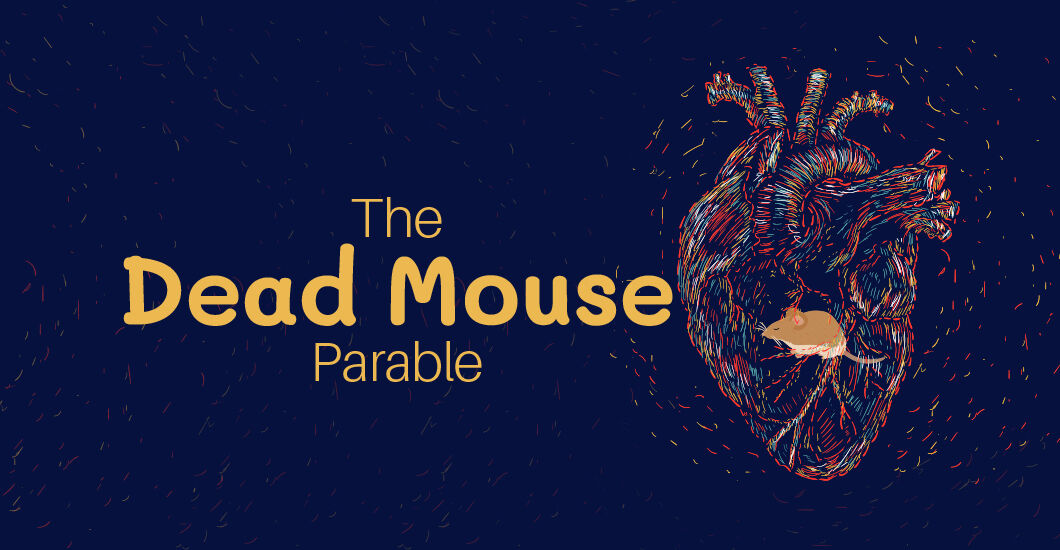
Sometimes the small things in life can teach us valuable lessons…
A friend recently shared an interesting story. She and her husband were driving on an uncomfortably warm afternoon and decided to turn on the air conditioning, which hadn’t been used all winter. Immediately, a horrible stench filled the car. It was so bad, my friend started gagging. She blurted to her husband, “Quick, turn it off! It smells like something died in here!” He turned off the AC and opened the windows to eliminate the horrible smell.
When they got home, her husband investigated. He started with the air filter, and sure enough, he found a dead mouse nestled inside. Because the mouse had died during the cold winter, there was no foul smell till the Spring thaw. My friend’s husband removed the mouse and its nest, and ran the air conditioning till the putrid smell dissipated.
Ways God Speaks
A story like this makes me think of parables. In the gospels, Jesus often used examples from everyday life to teach the people how to live and to reveal truths about Himself and the Father. Job 33:14 says, “God does speak, sometimes one way, sometimes another, but people do not pay attention to it.” I strive to be a person who pays attention to the Lord, so I make a habit of asking, “Lord, are you trying to teach me something through this? What’s the message here?”
As I reflected on the hidden rodent in my friends’ car and the stench it caused, I thought of how some things in our lives stay hidden, and then suddenly rear up and cause unexpected trouble. Unforgiveness or resentment are good examples. Those emotions, like the decaying rodent, often lie dormant in us without us taking notice. Then one day an emotional switch gets flipped, and the stench comes pouring out. Harboring resentment or unforgiveness or other negative emotions can have serious consequences. They fester and wreak havoc in our minds, our hearts, and in our relationships. Unless we deal with the source, they will cause great damage period.
What’s Inside?
So, how can we find out if there are hidden, stinky “rodents” in our hearts? An excellent method is that of Saint Ignatius of Loyola who advises that we pay attention to the inner movements in our souls, a method he calls the “discernment of spirits.” Ask yourself, “What agitates or unsettles me? What fills me with joy, peace, and contentment?” To discern “spirits” in our lives we first must acknowledge that there are spirits in our lives—good and bad. We have both an Advocate and an enemy. Our Advocate, the Holy Spirit, inspires and guides us to wholeness and peace. The enemy of our souls, Satan, the accuser, is a liar and thief who wants to “steal, kill and destroy” (John 10:10).
Saint Ignatius recommends that we spend time each day in quiet reflection to recognize what is stirring inside us. Invite the Lord to help you reflect and review. “Am I anxious, calm, happy, ill at ease? What is causing these movements? Do I need to act… Forgive someone… Repent of something and go to confession? Do I need to stop complaining and be more grateful?” Paying attention, with God’s help, to these inner movements of the heart, will enable us to identify trouble areas that need attention, so they can’t blindside us at a future time.
My friends took action only after they realized there was something causing a stench. And by dealing quickly with the problem, they were able to enjoy clean, cool air in their car for the rest of the summer. If we take time each day to get quiet with the Lord and ask Him to reveal what might be “off” in our spirits, He will show us and teach us how to handle it. Then the fresh air of the Holy Spirit can waft through us, and bring joy and freedom to our lives and relationships.
'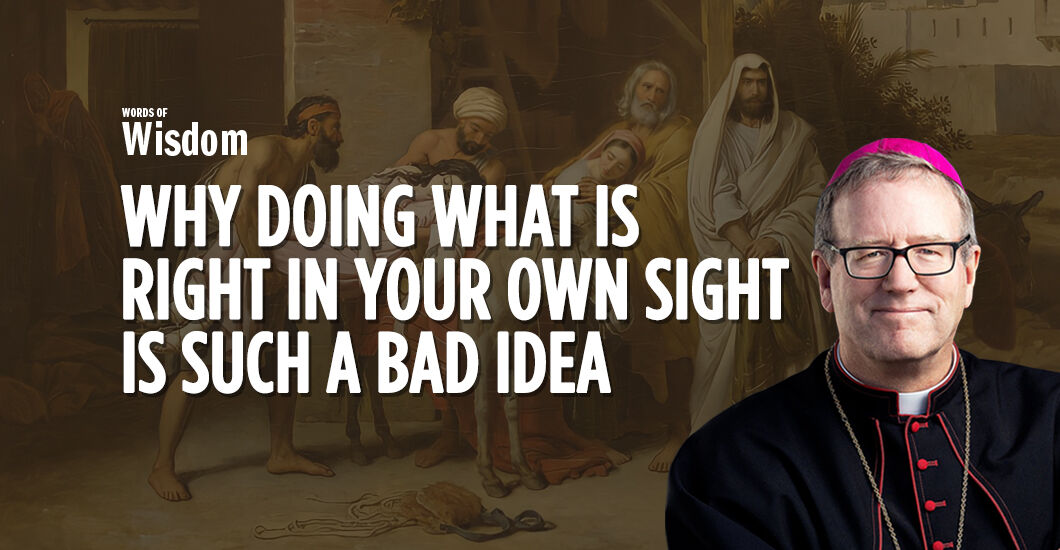
What does the Bible think about our current cultural fascination with finding our own voices, setting our own agenda, doing things according to our own lights? (By the way, if you doubt that this attitude is dominant today, I would invite you to watch practically any movie, listen to practically any popular song, or read practically anyone’s latest blog or Facebook posting). Is the Bible for or against this ego-dramatic approach to life? Might I suggest we look at the close of the book of Judges, a text marked by enough murder, mayhem, and miscreancy to put Martin Scorsese or Quentin Tarantino to shame.
After the death of Samson, the last of the judges of Israel, the tribes, we are told, drifted into disunity and commenced to manifest shocking violence to one another. The most remarkable and frankly sickening story, again in a book filled with such stories, concerns the outrage at Gibeah. We hear of a man from Ephraim in the north who had taken a concubine from Bethlehem in the south. When the woman escaped and returned home, the man came after her and took her back into his possession. He then set out with her and came to the town of Gibeah. We are told that “scoundrels” from the city that night surrounded the house. Exactly duplicating the infamous tale from the book of Genesis, the mob shouted to the owner of the place: “Bring out the man who has come into your house, so that we may get intimate with him.” With astonishing moral turpitude, the owner of the abode replied, “Do not commit this terrible crime. Instead, let me bring out my virgin daughter and this man’s concubine. Humiliate them or do whatever you want; but against him do not commit such a terrible crime.” At that, they shoved the concubine outside, and the men, we are blithely informed, “raped her and abused her all night until morning.”
Utterly indifferent to her suffering and humiliation, the man placed her, next morning, on his beast of burden and commenced the journey to Ephraim. When he arrived home, “he got a knife and took hold of the body of the woman, cut her up into twelve pieces, which he then sent throughout the territory of Israel. Was she dead when he found her that morning? Did she die on the way? Did he kill her? We’re not told, which only adds to the horror of the narrative. When the gruesome message was received across the nation of Israel, the elders assembled an army and attacked the city of Gibeah, effecting a general slaughter of the people.
Now, why do I rehearse this awful tale? Though there is a good deal of competition for the distinction, I believe that this gruesome and cruel episode represents the low point of human behavior described in the Bible. We have cruelty, crude physical violence, utter disregard of human dignity, sexual immorality, rape, cooperation with sexual abuse of the worst kind, murder, mutilation, and genocide. As an aside, I am always slightly amused when some Christians primly criticize me for watching, and in some cases recommending, films in which violence and immorality are on vivid display. I wonder, “Have they ever even read the Bible?” If the Bible were depicted honestly in film, the movie would receive at least an “R” rating. One of the great virtues of the Scriptures is that they are brutally honest about human beings and the myriad ways that we go wrong, the thousands of bad paths down which we walk.
Another virtue of the Bible is that its authors know precisely where all this dysfunction comes from. The book of Judges clearly indicates that the moral chaos it describes is a function of the disappearance of anything like moral leadership among the people. When the judges faded away, the law was no longer taught and enforced, and hence the people wandered into appalling behavior. Rudderless and without a captain, the ship simply smashes into the rocks. The final line of the book of Judges sums up the spiritual situation: “In those days there was no king in Israel; everyone did what was right in their own sight.” I would not interpret this necessarily as an endorsement of kings in the political sense, but rather of leadership in the moral sense. A healthy society needs leaders—political, economic, cultural, religious, etc.—who are animated by a keen sense of objective moral value, who have risen above mere subjective self-interest. The scriptural authors knew that the strident assertion of one’s own private prerogatives, so on display today, is fundamentally adolescent and morally catastrophic for any human community. This is why the heroes of the Bible are never those who “find themselves,” but rather those who heed the voice of God and remain obedient to the mission that God has given them. Mind you, as is often the case, the Bible trades in exaggeration and overstatement in order to get our attention, similar to the method employed by Flannery O’Connor in her macabre stories. So the almost cartoonish violence displayed in Judges is meant as a warning to a society such as ours that is increasingly losing its moral bearings: you might not be there yet, but this is where the road that you have embarked upon is leading you. Next time you find yourself wondering why the world is in such a precarious state, call to mind the final lines of the book of Judges: “Everyone did what was right in their own sight.”
'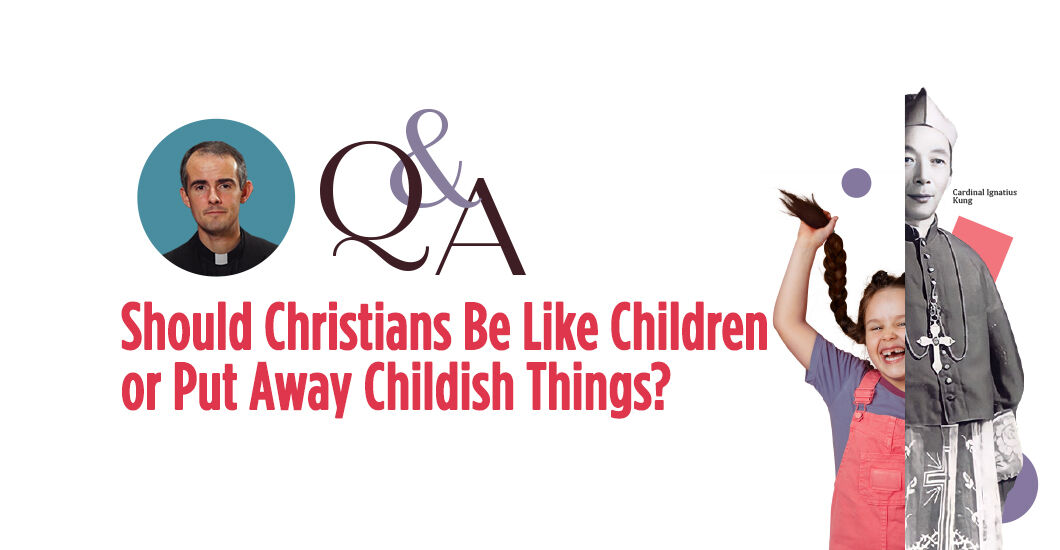
Q – Jesus tells us that we need to “become like little children” to enter the Kingdom of Heaven, but St. Paul tells us that we should be mature Christians (Ephesians 4). Which is it?
A – It is both! But let us examine what Jesus and St. Paul mean, for the virtues of children and of mature believers are different yet complementary.
First, what are the positive characteristics of children? They are innocent and pure, they are joyful, and they love wholeheartedly.
The mother of a seven-year-old boy named Christopher told me of the time she was telling her son the story of St. John Vianney. St. John Vianney was so holy that the devil once appeared to him and told him that if there were three men as holy as he on the earth, the devil’s kingdom would be destroyed. Upon hearing that story, Christopher started to cry. When his mother asked him what was wrong, Christopher said, “I am sad that there has only been one person that holy on earth. I want to be the second!” This child-like wholehearted love is what Jesus calls us to imitate.
Children often laugh because they don’t take themselves too seriously. They can be silly because they are not self-conscious and proud. Jesus wants us to live with that same abandon!
Frequently, a young child will give me a big hug – even if I have never met them before! In their innocence and purity, they can love others unconditionally. This is how we are called to behave. Children don’t judge others by their clothes or looks; they see only a potential friend.
Jesus calls us to be childlike. But we must distinguish between being childlike and being childish, which means displaying the selfishness, ignorance, and fickleness that also characterize children.
St. Paul tells us we should not be children in the faith, but mature men and women in Christ. What does it mean to be mature in Christ? A mature believer has persevered through difficulties, walks in deep intimacy with Christ, and possesses wisdom.
I teach at a Catholic school called Cardinal Kung Academy, named after Cardinal Ignatius Kung. Cardinal Kung was a Chinese bishop who had been arrested by the ruling Communist party in 1955 and imprisoned for over 30 years, many of which were in solitary confinement. After years of imprisonment and torture, the authorities brought him to a packed stadium in Beijing where he was expected to deny the Faith. Instead, he stood up in front of tens of thousands and declared, “Long live Christ the King!” With great affection the people responded, “Long live Bishop Kung!” This infuriated the authorities, who increased their torture of the bishop, but he never abandoned the Faith.
Here is a disciple who persevered through intense suffering, forging spiritual maturity in the harsh crucible of trials and tribulations. After he escaped to the US in 1986, he testified that it was his daily, intimate prayer with Jesus Christ that allowed him to stand firm in faith. Through it all, he came out without any bitterness or anger, but overflowing with wisdom.
So, to follow Christ is to have the beautiful virtues of children –singlehearted, unconditional love; bubbling joy and wonder; innocence and purity – and the tried-and-true perseverance, wisdom, and daily intimacy with the Lord that characterize those who are mature in faith. May we follow Christ living a faith of childlike maturity!
'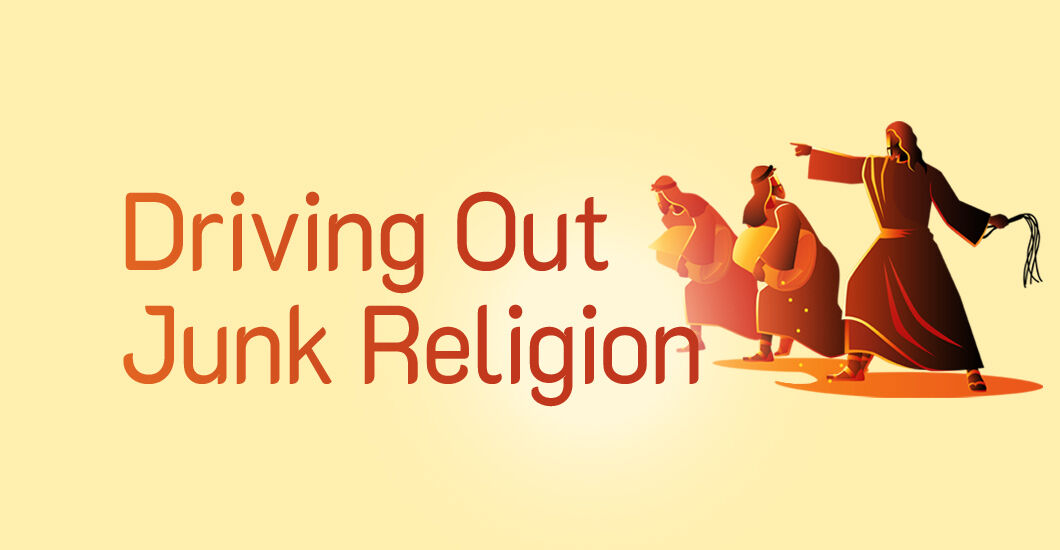
The dramatic account of the Cleansing of the Temple found in chapter 2 of the Gospel of John tells of Jesus going to the Jerusalem temple where He finds merchants selling oxen, sheep, and doves and money changers sitting at their tables. Making a whip out of cords, He drives them out of the temple area, overturns the moneychangers’ tables and orders them to “stop making my Father’s house a marketplace” (v. 16).
Jesus did not strike anyone, but this dramatic action so close to Passover, certainly got the attention of the crowds and sparked a backlash from the religious authorities and from those whose economic interests were being threatened.
Jesus’ behavior in this account challenges us to seek not our own advantages and interests, but the glory of God who is love. Jesus’s bold intervention cleansed the Temple of “junk religion” to make room for real religion. What does junk religion look like today?
Put simply, junk religion is picking and choosing elements of the Catholic Tradition that support our personal agenda while conveniently putting on blinders to those Catholic elements that don’t. We can do all the right things—attend Mass regularly, appreciate good liturgy, give generously, quote scripture and even understand some theology, but if we don’t let the Gospel penetrate to the depth of our hearts, we end up domesticating the Catholic faith and reducing it to “junk religion.” Without that deep commitment, religion becomes less about the Good News and more about oneself and one’s personal ideology—no matter which end of the political spectrum we find ourselves.
The Gospel calls us to embrace the Way of Jesus, which is self-emptying and forgiving. We are called to be nonviolent and to promote justice and goodness. And we need to do those things both in season and out when it is easy and when isn’t. When the going got tough, the Israelites wanted to return to the comfort and security of their old life in Egypt. Like them, we may be tempted to wear religion as a garment that makes a statement about us rather than letting it be a leaven that changes us from within. We must remember that we are instruments of God’s generous and supportive love and be steadfast to our call.
Our ritual and devotional practices will remind us that true adoration of God consists of giving thanks for life and expressing gratitude by sharing our lives with others. If we do that, we will incarnate the risen Christ in the here and now. We will usher peace with justice into our community. In sum, we will be practicing genuine religion, binding ourselves to a God who only wants to love us and be loved in return.
'
For years I struggled with gluttony not realizing the root cause behind my overeating
Yesterday, as I was getting ready for Mass, I was thinking about my continuing battle with overeating. Though I may not appear visibly overweight to the average person, I know that I eat more than I should. I eat even when I am not hungry, just because the food is there and I am tempted by it. Since I had finished dressing for Mass before my husband was ready, I decided to open a Saint Jude prayer book that I use every night for prayer to see if it also had a Morning Prayer. As I flipped through the pages, I came across a prayer for addictions which I had never noticed before. As I said the prayer, I especially asked God to heal me of my food addiction. Although I had tried to overcome the desire to overeat for years, my efforts had failed.
Driving Away
At Mass, the Gospel Reading was Mark 1:21–28. I said to myself, “In the same way that Jesus can drive the evil spirit out of this man, He can drive this spirit of gluttony out of me because this is how the evil one still has a hold on my life.” I felt that God was reassuring me that He could and would drive out this spirit of gluttony from me. My feelings were strengthened by the priest’s homily.
In his homily, he listed many types of evil spirits we need deliverance from, such as anger, depression, drugs, and alcohol. The one he struggled with the most was food addiction. He explained how he lost forty pounds, only to gain back thirty. He added that no matter how much he has tried to stop himself, he always gives in to the temptation to overeat, thus committing the sin of gluttony. Everything he described related directly to me. He reassured us that Jesus came and died to set us free, so we cannot give up hope no matter how hopeless we feel, because hope is always there. Jesus gives us hope because He overcame death and rose again. We can thus claim victory because He has defeated the power of sin in our lives. We simply need to trust that Jesus will come to our rescue, in His own time.
When we are slow to realize that we cannot do anything without His help, God sometimes allows us to be in positions where we feel helpless. This morning, during my morning prayer, I opened my book of daily reflections to a reading focused on finding peace. To find peace we must be in accord with God’s will. When we are in accord with God’s will, we can more effectively help others and lead them to the Lord.
How can I help someone else if I am perfect? Can I understand someone else’s struggles if I have not struggled? When I am striving against a sin, like gluttony, my battle is not in vain. It is for a reason. God allows us to experience difficulties so that we can empathize with and help others and to realize that we are no better than anyone else. We all need each other, and we all need God.
Strange Connection
Saint Paul demonstrates this when he asserts “a thorn in the flesh” was given to him to keep him from becoming “too elated” and Christ told him that “power is made perfect in weakness”. So, he would “boast most gladly of my weaknesses, in order that the power of Christ may dwell with me.” (Corinthians 12:7–9)
This Scripture teaches me that struggling with my addiction to food is meant to keep me humble. I cannot feel superior to anyone because I also struggle to overcome temptation, like everyone else, whether they believe in God or not. However, when we do believe in God, the struggles become easier because we see a purpose in continuing the battle. Many people struggle with addictions and other problems for various reasons, one of which could be due to the consequence of sin. However, when a person is a believer of God and a true follower, he or she recognizes that his or her problems are meant for the good and not as a punishment. Romans 8:28 teaches us that “all things work for good for those who love God, who are called according to His purpose.” Most importantly, this is the reality for all who are called to God’s purpose. Knowing this truth makes the difference between seeing problems, addictions, and sufferings as punishments, or as blessings that will work for our good in the long run. When a person is called by God according to His purpose, that person is fully aware of this call, so he or she accepts the good and bad in his or her life as God’s will.
As I pondered, I tried to recall when my eating addiction had started. I became shamefully aware that my own addiction to food started when I confronted and condemned one of my own relatives regarding his addiction to drugs and alcohol.
I can now recognize that at the same time I was angrily condemning my relative, I was slowly becoming addicted to food myself. Ultimately, condemnation and lack of forgiveness were the sources of my addiction. The Lord had to humble me by revealing, through my own addiction, that we are all weak. We all face addictions and temptations, and struggle with them in many forms. In my pride, I thought I was strong enough to overcome temptations on my own, but in falling prey to my gluttony, I discovered that I was not. Eight years later, I am still struggling to overcome my food addiction and this sin of gluttony.
God cannot use us if we feel superior to others in any way. We have to be humble enough to come down to the level of those who need us, so we can help them where they are. To avoid judging others for their weaknesses, we should pray for them, extend help and offer up our own struggles for them. Isn’t this the reason why God puts sinners and those who are hurting in our path? Every time we encounter someone else, we have the opportunity to show them the face of God, so we should leave them in a better state for having come across our path, not more hurt or broken. In Luke 6:37, Jesus warns, “Stop judging and you will not be judged. Stop condemning and you will not be condemned. Forgive and you will be forgiven.”
'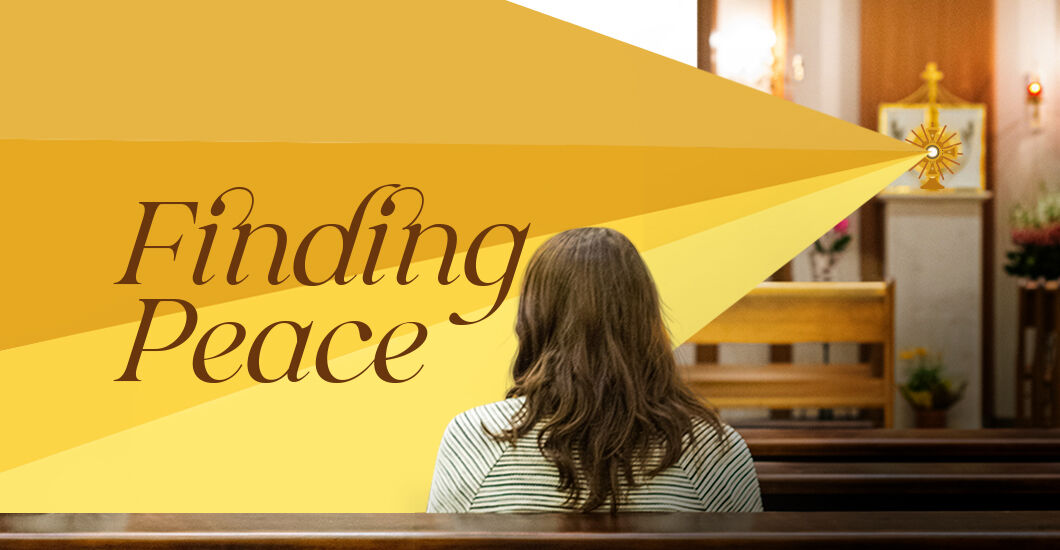
Get to know the greatest power in the universe that is capable of transforming you…and the face of the world
In 2019 our Parish completed a church renovation that added a gathering space, pews, elevators, and bathrooms that made our church more accessible and welcoming. But three years after the renovation, it seems that few parishioners know about the most transformative addition of all: The Perpetual Adoration Chapel located in our church basement.
The Best Time on Earth
Tucked between our new Teen/Senior room and a busy staircase is a beautiful, intimate, sanctuary set aside for Eucharistic Adoration. Catholics believe Jesus is truly present—Body, Blood, Soul and Divinity—in the Holy Eucharist. Eucharistic Adoration is our worship of the Eucharist outside of Mass. Twenty-four hours a day, seven days a week anyone can enter this intimate space to spend time in adoration of the Eucharistic Lord displayed in a beautiful monstrance on the altar.
Saint Teresa of Calcutta once said, “The time you spend with Jesus in the Blessed Sacrament is the best time that you will spend on earth. Each moment that you spend with Jesus will deepen your union with Him and make your soul everlastingly more glorious and beautiful in heaven, and will help bring about an everlasting peace on earth.” Bring about everlasting peace on earth? Who wouldn’t want to do that?! And yet, most days I am just trying to be a better mom.
A Strong Companionship
Over the past year, Eucharistic Adoration has become an essential part of my relationship with Jesus and of my effort to parent with greater love. For “if I have a faith that can move mountains, but have not love, I am nothing” (1 Corinthians 13:1).
The Adoration Chapel is where I go when I feel far from Jesus. It is where I deal with the daily struggle of accompanying my family on the path to sainthood. I once saw a sign outside a church that said, “Come as you are; you can change inside.” That’s how I feel heading into Adoration—no need to dress up or make special preparation. Even if it’s been a while, I enter the chapel and pick up where I left off. My adoration time is a lot like the one-on-one time I spend with the people I love most. Just like “date night” with our spouse or having that long talk with a good friend anchors those relationships, Adoration builds trust with God and develops the kind of companionship that is comfortable with silence and presence.
What does one do in Adoration? My routine varies. Sometimes I pray the Rosary, other times I meditate on a scripture passage or spend time journaling. We tend to try so hard to find God that we don’t allow Him time to find us. So, most often, I simply put myself in the Lord’s presence and say, “Lord, here I am. Please guide me.” I then lift up situations or “knots” I need help with and pray for anyone for whom I promised prayer that week.
I usually leave the chapel feeling strengthened, at peace, or nudged in a new direction. Spending one-on-one time with our Lord makes our relationship more intimate. When you hear a family member coming down the stairs, you know who it is from the sound of their footsteps. That familiarity results from the amount of time we spend with family members and gives us a deep sense of knowing and appreciating each of them. Adoration fosters that kind of familiarity with God.
Consider spending time with Jesus in the Blessed Sacrament by visiting an Adoration Chapel. Whatever your situation—if you haven’t been attending Mass regularly, if you need to lay struggles at the Lord’s feet, if you want to become a more loving parent, or if you just need to step away from the chaos of your day and step into the sacred silence of Adoration— no matter the need, you are always welcome into the Lord’s presence. Regular time in adoration will shape us as Christian disciples and as parents. As Mother Teresa tells us, it may even “bring about everlasting peace on earth”.
'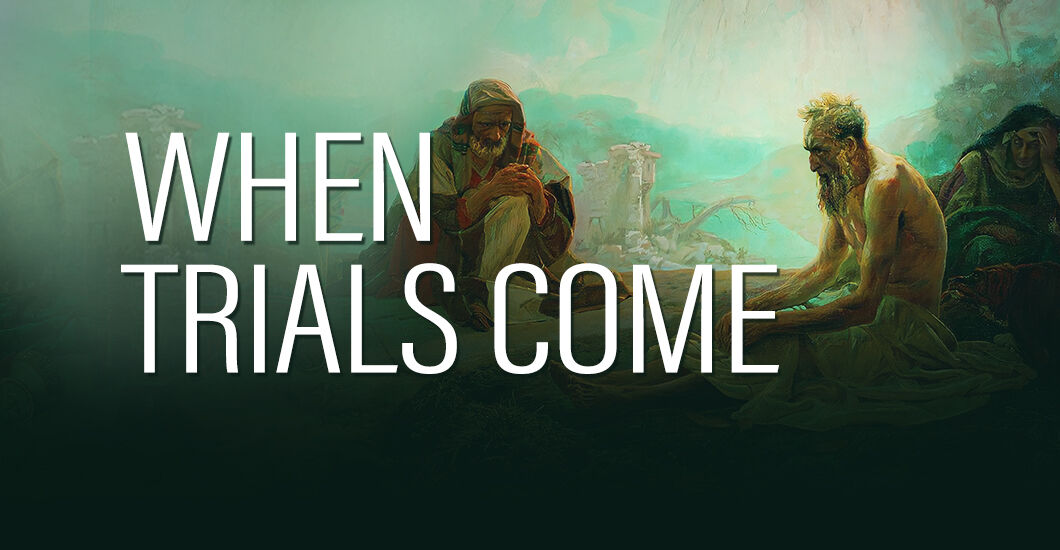
Daunted by the struggles in your life? Take charge today to turn those struggles into blessings!
The Book of James tells us to rejoice in our trials? But is that possible, especially when you feel like you are stuck in a spin cycle and the best you can do is take one more breath before you get dunked again? Is it possible during a 3-year pandemic that has challenged many of us in ways we never imagined?
There were days during the past few years that I have felt like I was in a movie. Movies can teach us a lot of things and the best movies, the ones that make you sigh with a confident smile, don’t just have a good ending. They contain an underlying truth that flows throughout the storyline and builds to a crescendo. Such movies create an unexplainable pulling inside the viewer that cries out, ‘there’s more than what you can see, there’s a deeper truth here’.
Though it is not a movie, that is what I sense when I read the book of Job in the Old Testament. If the story were just, ‘Job got tested, lost everything and got back more than he had before,’ then I’d say, “No thanks, I’d rather keep what I have and skip all the trauma.”
But there is something deeper going on under all of Job’s trials and tribulations. This deeper something going on in Job’s story can be a powerful resource for all of us as we continue through Covid’s waning days and experience life’s other challenges.
Digging In
In the book’s very first verse we learn that Job “was a blameless and upright man who feared God and avoided evil.” Job was a good man, an exemplary man, and if anyone should be spared calamity, it should be this man. I used to expect that because I was doing the right things, because I dedicated my life to God and desired to follow Him, that my life path would be smooth—at least somewhat. But my life experience has managed to eradicate that thought from my mind. Job reminds us that God doesn’t guarantee an easy life to anyone, not even his friends. God’s only guarantee is that he will walk with us in the struggle!
Job loses everything, and I mean everything. By the end, he contracts a skin disease that makes leprosy look like eczema. And all the while, he refuses to curse God. Keep in mind, Job doesn’t have the Bible to fall back on. All he has are stories passed down through generations about who God was and how God operated. At some point, he made a choice–the same choice each of us must make: Will we follow what we cannot see to gain what we cannot deny?
After enduring tremendous agony and loss, Job wishes he had never been born. This was no flippant teenage tantrum following a lovers-quarrel and break-up. Job had been pushed beyond any reasonable breaking point. All his wealth was gone, all his livestock, his land, buildings, servants, and most tragic of all, his children were all dead. And rubbing salt in the wound, his skin disease was like a constant drum beat reminding him of his losses.
Just in Time
It is at this point, in Chapter 38, that God finally corrects Job. You might expect this would be a good time for God the comforter to wrap His arms around him, or God the warrior king to come kick the enemy to the curb. But instead, God speaks in correction. It may be hard for us to grasp it, but Job needed that particular response from God more than he needed any other response.
How can I say this with confidence? Because God always knows what we need. God gives us what leads to growth, to wholeness, and to salvation—if we let it. Our part is to decide if we trust that what God is doing is for our own good.
The beautiful, underlying truth that has been flowing underneath Job’s story line finally surfaces at the start of Chapter 42 where Job confesses, “By hearsay I had heard of you, but now my eye has seen you. Therefore, I disown what I have said, and repent in dust and ashes.”
In this single verse we find the crux of Job’s journey. That sense that there was more than we could see, a deeper truth we could sense but not name, has now become apparent.
Up till this point, Job has heard about God from others. His knowledge of God has been “hear say.” But the devastation he has walked through has become a path that allows him to see the one and true God directly, with his own eyes.
If God wanted to meet you face to face, if He wanted to be closer to you than you could imagine, what would you be willing to endure for that to happen? Can you choose to see these last two years as a sacrifice of worship to God? Can you look at all the trials in your life, all the losses and hardships, and discern God’s mysterious will working through them?
Take a moment now and offer your trials to Him as worship, and then rest in the peace that comes rushing in!
'
Listening to that still, small voice…
Whispers come unexpectedly. Those quiet words found in a book or heard from a friend or homilist that cross our paths at just the right moment—a moment when our hearts are graced to hear them in a fresh or unique way. It happens like a flash of lightening suddenly illuminating the landscape below.
Such a phrase caught my eye recently, “When you replace judgment with curiosity, everything changes.” Hmm…I paused to consider the sentence. It made sense! I had practiced replacing negative thoughts with positive affirmations and various Scriptures over the years, and it resulted in a new way of thinking. I seemed to have a genetic predisposition toward negativity. This tendency which I had seen in one of my parents as I grew up had become ingrained in me, but that wasn’t who I wanted to be. As a result, I found myself attracted to optimistic friends! They exhibited something different to my experience, and I was drawn to it! Looking for what was good in others was the object, but it extended to searching for the positive in the midst of difficult circumstances, too.
Life is full of obstacles and challenges; anyone who has lived any length of time on this earth knows that. The Gospel of John quotes Jesus speaking this truth: “I have told you these things, so that in me you may have peace. In this world you will have trouble. But take heart! I have overcome the world.” We see His words enfleshed in people like Helen Keller, who despite an illness that left her deaf and blind, was able to voice that “although the world is full of suffering, it is full also of the overcoming of it. My optimism, then, does not rest on the absence of evil, but on a glad belief in the preponderance of good and a willing effort always to cooperate with the good, that it may prevail. I try to increase the power God has given me to see the best in everything and everyone and make that best a part of my life.”
Over time, my efforts and God’s grace, resulted in responding to hardships by immediately directing my attention to what I could be grateful for despite the unwelcome circumstances. It’s easy to get caught up in “stinking thinking!” It takes intention and courage to choose to redirect internal and external conversations away from complaints, criticism, and condemnation! I have reflected often on these words I first heard as a young adult: “Sow a thought, reap an action. Sow an action, reap a habit. Sow a habit, reap a lifestyle. Sow a lifestyle, reap a destiny.”
What we think precedes what we do. What we do repeatedly becomes a habit. Our habits comprise the way we live our life. The way we live our life, our choices over time, makes us who we are. I didn’t believe these words just because someone said them. One only needs to attend funerals and listen attentively to eulogies to learn this truth! How someone lives their life determines how they will be remembered…or if they will be remembered.
Of course, a life well lived requires frequent reflection, as well as a willingness to adapt. Now I am pondering the admonition to ‘replace judgment with curiosity.’ There are opportunities all around me! Just as I hadn’t wanted to live life with a negative outlook in the past, now, I don’t want a judgmental attitude to make it harder to obey Jesus’ commandment to love my neighbor as myself.
I found an opportunity to try out this new response almost immediately! Something a friend shared with me the next day quickly evolved into a judgment about another person, and quick as lightening, I found myself agreeing! But just as swiftly came the whisper, “When you replace judgment with curiosity, everything changes.” In an instant, choosing to be curious as to why the person made the choice that the two of us found so easy to judge, a plausible reason came to mind! It was true….curiosity does change everything! And even if it doesn’t, it can change me…and wasn’t that the goal all along?!
“If we could read the secret history of our enemies, we would find in each human’s life sorrow and suffering enough to disarm all hostility.” – Henry Wadsworth Longfellow
'